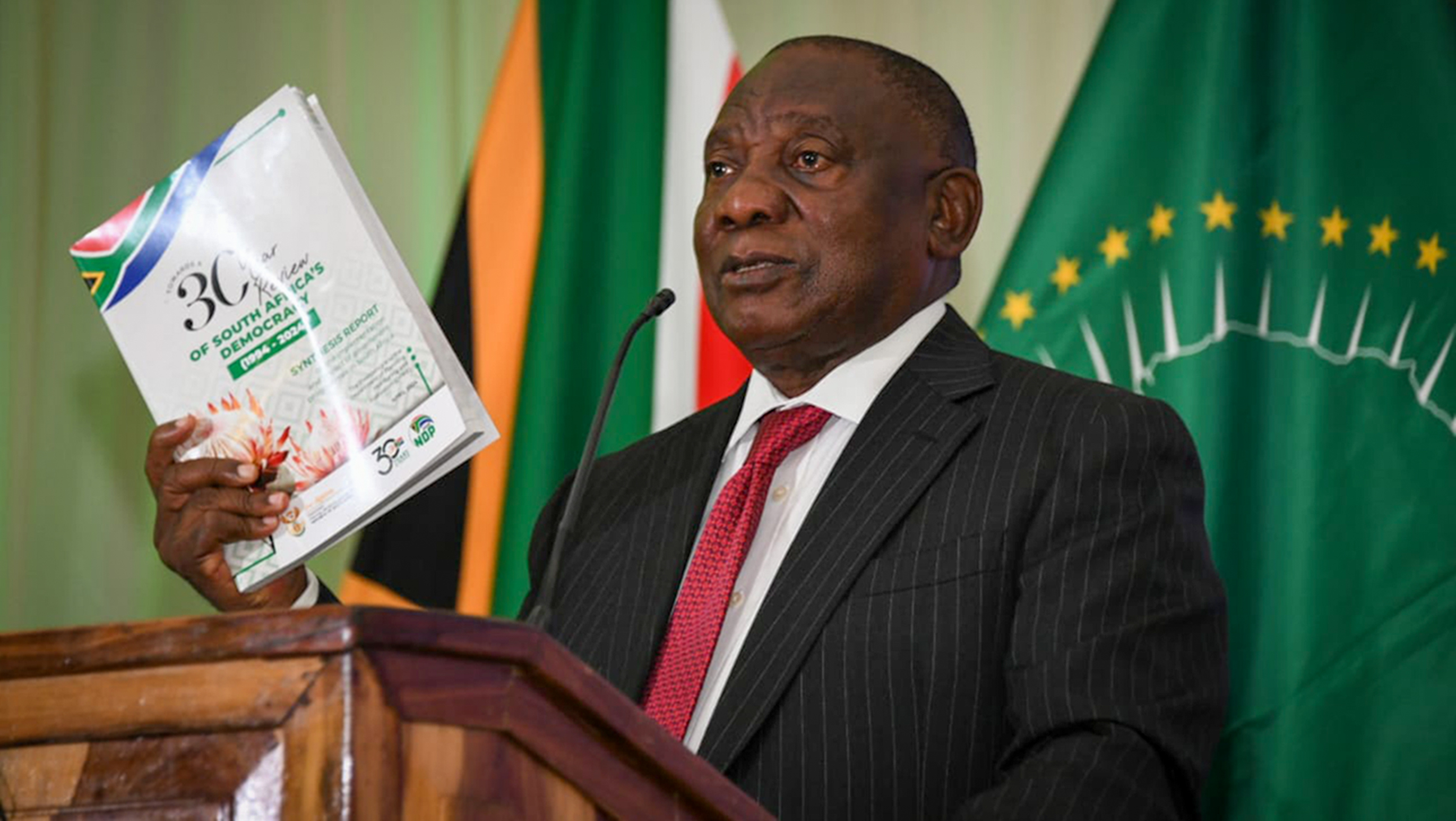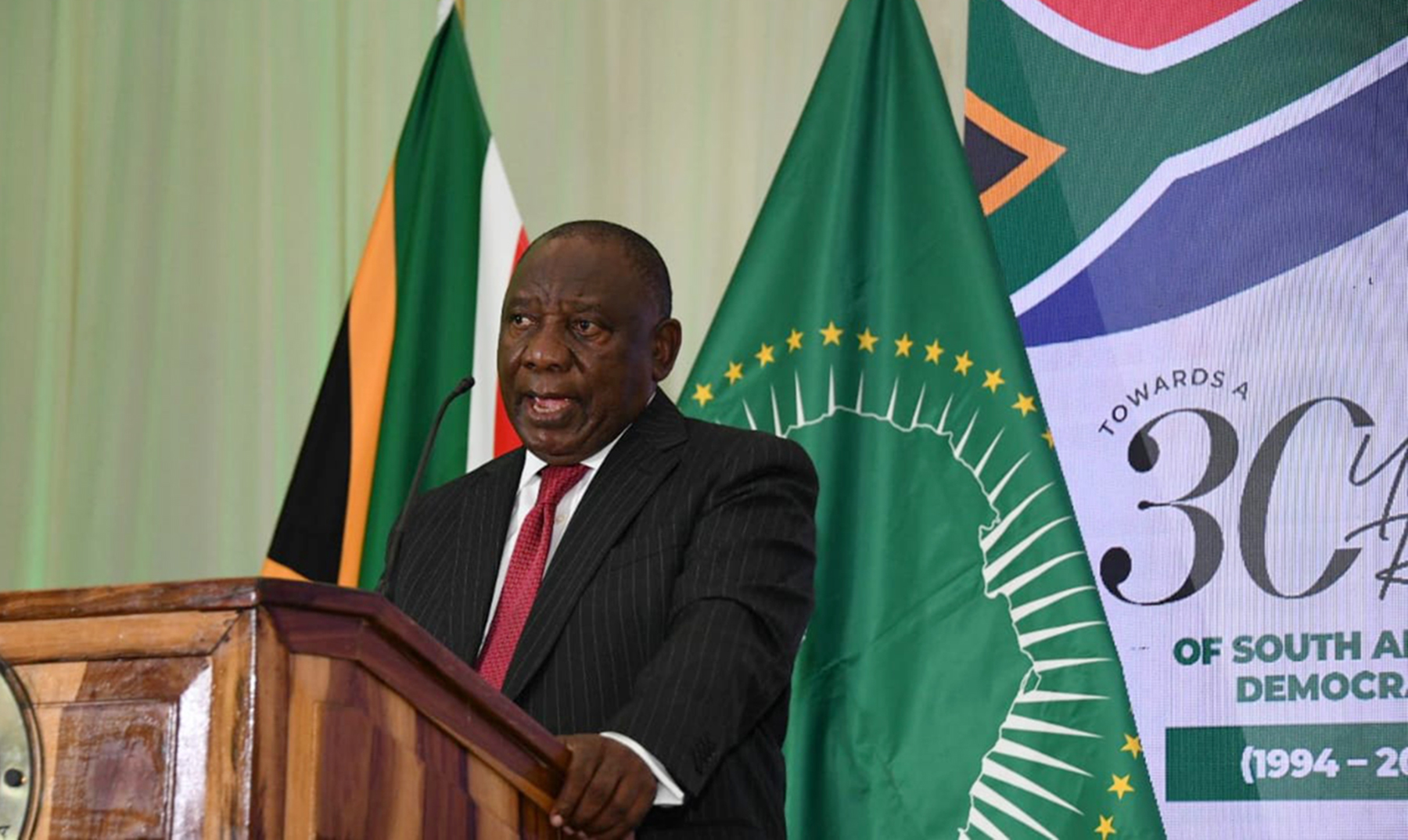SA CHRONICLES
30-Year Review of report ‘valuable instrument for transformation’ says Ramaphosa

President Cyril Ramaphosa says the story of 30 years of democracy contained in the 30-Year Review Report of South Africa’s Democracy is an honest and critical appraisal that will be a valuable instrument for transformation, progress, and growth.
“South Africa has a good story to tell. Our country’s democratic transition continues to inspire hope for many nations worldwide. Over the 30 years, South Africa has maintained a stable democracy which continues to evolve”.
These were the words of Maropene Ramokgopa, Minister in the Presidency responsible for Planning, Monitoring and Evaluation.
Ramokgopa was speaking during the launch and handover of the 30-Year Review Report of South Africa’s Democracy to President Cyril Ramaphosa at the Sefako Makgatho Presidential Guest House, in Pretoria on Wednesday 8 May, 2024.
The report reflects on the political, social, and economic journey of transformation of South Africa since 1994 at the advent of democracy, to derive lessons and make recommendations for the country’s development agenda.
Review a ‘tribute to those who fought for our freedom’
President Cyril Ramaphosa provided the keynote address at the launch and noted that on this day, 8 May 1996, the Constitutional Assembly adopted the new democratic Constitution.
“The Constitution that was adopted on that day gave legal form to the vision contained in the Freedom Charter and continues to guide both the functioning and the direction of our democracy. While this 30-Year Review is about the journey South Africa has traversed since the advent of democracy, it is also a reflection on progress towards the aspirations of the Freedom Charter and our democratic Constitution,” he said.
Ramaphosa said the vision of a free South Africa has inspired and guided the struggle of people for many decades and for many generations — a vision that lies at the heart of the Freedom Charter.
“While this 30-Year Review is about the journey South Africa has traversed since the advent of democracy, it is also a reflection on progress towards the aspirations of the Freedom Charter and our democratic Constitution. This Review is undertaken as a tribute to all those who fought for our freedom, and for all South Africans who have worked together to build and enrich our democracy,” he said.

President Cyril Ramaphosa during the launch of the 30-Year Review Report of South Africa’s Democracy. (Photo: GCIS)
Strides made in three decades
Ramokgopa said since the advent of democracy in 1994, the government has been at the centre of socio-economic transformation by implementing progressive policies and programmes to improve the economy, society, governance, and International Relations.
For the past 30 years, South Africa has maintained a stable democracy due to the government’s commitment to eradicating the legacy of apartheid, establishing democratic institutions, enacting laws and policies, and building a democratic unitary state with new values that align with the Constitution, she said.
Ramokgopa said public service has shifted from serving the minority to serving all sections of the population, and in 2020, the number of households with access to electricity, piped water, and sanitation was above 80%.
“One of the factors indicating the growth of our democracy is the reduction of poverty and deprivation levels in society, with key indicators such as the Multidimensional Poverty Index (MPI) and the Human Development Index improving over time. This is a combined outcome of various progressive policies and programmes for economic growth, redress, and social wage. South Africa’s social wage is one of the most comprehensive in the world and has proven to be an effective anti-poverty tool,” said Ramokgopa.
Read more in Daily Maverick: South Africans drowning in rising cost of living — urgent state intervention is needed
According to the report, South Africa is moving towards universal access to education at all levels and access to health care has improved significantly as a direct result of government policies and programmes, with access to primary health care services increasing from 68 million people in 1998, to 138.8 million people in the 2023/2024 financial year.
“The central chronic medicines dispensing and distribution programme reached almost 5.6 million beneficiaries. These interventions have led to an improved health status of citizens in terms of life expectancy, mental health, child health, reduced disease burden, and HIV/Aids-related deaths,” she said.
Ramaphosa said South Africa is a vastly different place compared to what it was 30 years ago due to successive democratic administrations having implemented progressive policies and programmes to uplift the material condition of all South Africans, particularly society’s most vulnerable.
“These policies have included the provision of basic services, housing, education, health care, and social support,” he said.
Ramaphosa said there is an established unitary, democratic state, institutions to uphold democracy and promote accountability, an independent judiciary, a robust civil society, a free media, and a clear separation of powers between the executive, legislative, and judicial branches of government.
“We have advanced transformative policies to change the racial and gender composition of the economy and the workplace. We have implemented laws to protect workers and advance their rights. We have restored land to many who had been dispossessed and have provided emerging farmers with the means to productively use their land,” he said.
More work needs to be done
Minister in the Presidency Khumbudzo Ntshavheni reflected on 30 years of freedom and democracy in South Africa, saying it is a journey of triumphs, challenges, and ongoing progress.
“It’s a testament to the resilience and spirit of a nation that has overcome immense adversity to embrace unity, democracy, and equality. While milestones like the end of apartheid have been monumental, there’s recognition of the work still ahead to address systemic issues and ensure that freedom truly reaches every corner of society,” she said.
Ntshavheni said while 30 years may seem like a long time ago when one considers what the democratic state inherited in 1994, it was always clear that the journey would be long and with many highs and lows. Against this backdrop, the South African story continues to inspire millions of people all over the world especially those who continue to wage struggles against oppression, she said.
Ramaphosa acknowledged that there was still work that needed to be done.
“We are contending with slow economic growth, high unemployment, poverty, inequality and underdevelopment. We know that for millions of South Africans, the promise of 1994 has not yet translated into the meaningful change that they seek and deserve,” he said.
Ramaphosa stressed the need to resolve the challenges that are holding back the country’s progress and said efforts to overcome the energy crisis, implement structural reforms to boost economic growth, drive programmes that create more employment, and improve the capacity of the State to deliver services would continue.
“If we are to fully transform this country, we must renew the same pledge made by our forebears at Kliptown — to strive, sparing neither strength nor courage, until the democratic transformation is complete,” he said.
Ramaphosa said the review is not only retrospective, it also looks to the future as it will be used to inform future government planning, to achieve the vision of the National Development Plan by 2030, to plan for the decades ahead, and contribute towards improved policy implementation.
“This 30-Year Review Report is much more than a chronicle of a changing nation. As we chart the path ahead for our democracy, we will look to this Report as a valuable instrument for transformation, progress, and growth,” he said. DM















That dollar couch guy’s crew still rabbit on about ‘transformation’ 30 years after they obtained the keys to the country with an overwhelming majority and the power to do whatever they chose should make them embarrassed. Fortunately they seem embarrassment proof and miss the irony.